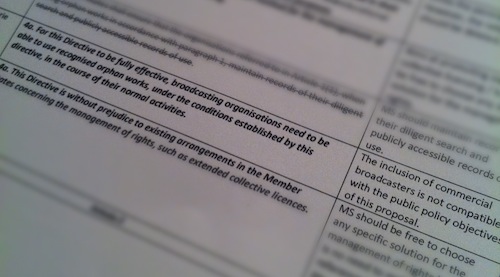Public policy vs. ideology
Earlier this week i found myself in the bathtub reading through this list of voting recommendations by the ‘Audiovisual Coalition/EP CULT Committee‘ on the ‘Proposal for an orphan works directive’. The voting list makes voting recommendations with regards to amendments (proposals to change the text of the proposed directive) suggested by various Members of the European Parliament. In total it lists 230 amendments and recommends either to vote for them or against them. Here is one of them (amendment 195 by Jean-Marie Cavada):

CULT voting list on orphan works directive, amendement 195
For me these two boxes full of text pretty much capture a lot of what is wrong with public policy making in the field of copyright. But first, let’s recall what this directive is about:
- There is a large class of copyright protected works where the rights holders are unknown or where it is unknown if they are still protected by copyright.
- Copyright law makes most uses of a copyright protected work conditional on the permission by the rights holder(s).
- Such permission cannot be obtained when the rights holder is unknown when it is unknown if there still is a rights holder.
- As a result works without a known rights holder (‘orphan works‘) cannot be used without infringing copyright.
- This outcome is highly undesirable since it does not benefit anyone, neither the rights holders nor members of the public who might want to use such works.
The proposed directive on orphan works seeks to address this issue by allowing certain uses of orphan works on the condition that a diligent search has been carried out and that this search has failed to locate the rights holder. The core of the proposal is relatively undisputed. The discussion in the European Parliament (and in other places) centers on the scope of the above mentioned ‘certain uses’ and the question who should be entitled to make such uses.
This is where the above snippet from the voting list becomes intresting. MEP Cavada proposes (left box) to add a new article to the directive that would allow broadcasting organizations to use recognized orphan works (i.e works where a diligent search to locate a rights holder has been unsuccessful):
4a. For this Directive to be fully effective, broadcasting organizations need to be able to use recognized orphan works, under the conditions established by this directive, in the course of their normal activities.
In response, the voting list compiled by the CULT committee indicates that MEP’s should vote against this amendment and provides the following argument to support this recommendation (right box):
The inclusion of commercial broadcasters is not compatible with the public policy objectives of this proposal.
Now the interesting part of the argument is the reference to a ‘public policy objective’ that is said to underpin the proposed directive. As i have outlined above the objective of the proposal is to make copyright protected works that have been rendered inaccessible by a dysfunctional copyright system available again.
Available for the public to access these works, but also available for the public to re-use them, and to build upon them. So the public policy objective of the proposed directive is to provide access to these works and it should be self evident that (commercial) broadcasting organization are an important platform facilitating such access.
For some reason the CULT committee of the EP (and many other stakeholders in this debate) seem to have completely lost track of this objective. Instead of promoting access to works that are rotting away in archives (often at enormous costs to the public that is paying for archiving and preserving them), every possible effort is undertaken to limit access to orphan works as much as possible.
The general consensus seems to be that only non-commercial uses by non-commercial cultural heritage institutions who have the actual works in their collections should be allowed. Quite obviously this is not in line with any public policy objectives, since it keeps the works out of reach of most of the public.
The reference to the public policy objective in the voting recommendation perfectly illustrates to what degree the discussion about orphan works (and more broadly copyright) has been captured by special interests. Those trying to limit the scope of the directive are willing to risk enormous amounts of collateral damage in order to make sure that the ideology of unalienable exclusive rights of authors does not get undermined.
It is pretty disappointing to see that the CULT committee of the European Parliament seems utterly incapable to distinguish between special interest driven ideology and public policy here.
